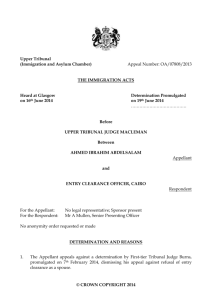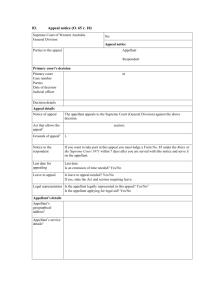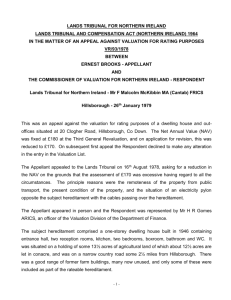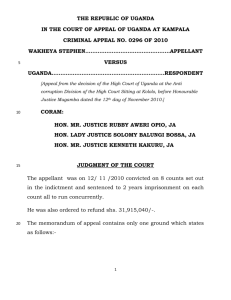Appeal Number: AA/05085/52013 Upper Tribunal (Immigration and
advertisement
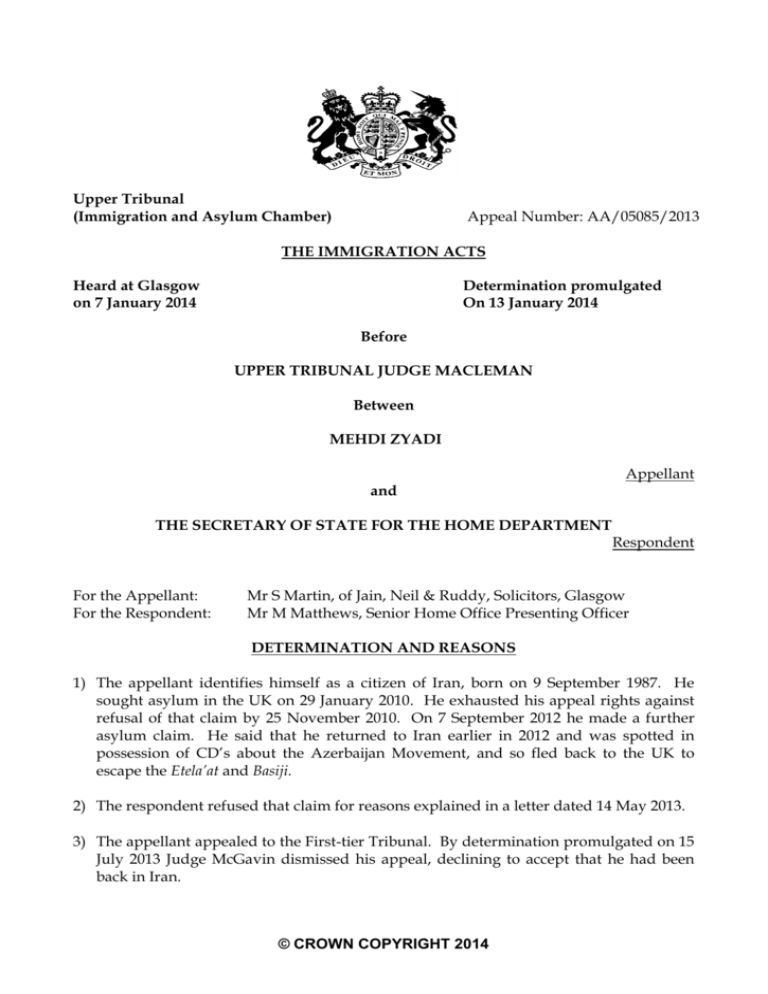
Upper Tribunal (Immigration and Asylum Chamber) Appeal Number: AA/05085/2013 THE IMMIGRATION ACTS Heard at Glasgow on 7 January 2014 Determination promulgated On 13 January 2014 Before UPPER TRIBUNAL JUDGE MACLEMAN Between MEHDI ZYADI Appellant and THE SECRETARY OF STATE FOR THE HOME DEPARTMENT Respondent For the Appellant: For the Respondent: Mr S Martin, of Jain, Neil & Ruddy, Solicitors, Glasgow Mr M Matthews, Senior Home Office Presenting Officer DETERMINATION AND REASONS 1) The appellant identifies himself as a citizen of Iran, born on 9 September 1987. He sought asylum in the UK on 29 January 2010. He exhausted his appeal rights against refusal of that claim by 25 November 2010. On 7 September 2012 he made a further asylum claim. He said that he returned to Iran earlier in 2012 and was spotted in possession of CD’s about the Azerbaijan Movement, and so fled back to the UK to escape the Etela’at and Basiji. 2) The respondent refused that claim for reasons explained in a letter dated 14 May 2013. 3) The appellant appealed to the First-tier Tribunal. By determination promulgated on 15 July 2013 Judge McGavin dismissed his appeal, declining to accept that he had been back in Iran. © CROWN COPYRIGHT 2014 Appeal Number: AA/05085/52013 4) The appellant sought permission to appeal to the Upper Tribunal, on grounds set out in 8 paragraphs. The First-tier Tribunal refused his application, but on renewal permission was granted by Upper Tribunal Judge P Lane: … with some reluctance, as many of the grounds strike me as mere disagreements with the findings of the FtT Judge. However, the judge was very arguably wrong to say that the name “Jaffar Zyadi” does not appear in the translation of the envelope allegedly sent to the appellant: it occurs as part of the phrase “Jaffar Zyadi Residence”. It is also unclear what significance, if any, was attributed by the judge the fact that the name “Ali Zeyadi” did not appear on the translation of the envelope, given that the name is written in the western alphabet on the original. Finally, paragraph 25 of the determination records the failure of the translator to certify the translation, without explaining what significance, if any, this played in the judge’s conclusions on the issue of the prescription. These arguable errors are arguably material to the overall conclusions … 5) At the outset of the hearing on 7 January 2014, Mr Martin sought an adjournment. He said that the appellant had been told of the grant of permission. At some later date his NASS support was removed because he was not residing at the accommodation provided. Mr Martin understood that the appellant had moved to Crawley, where he was living with a girlfriend. The notice of the hearing on 7 January 2014 was issued by the Upper Tribunal on 4 December 2013 and forwarded to the appellant on 6 December 2013 at the new address he had given to his solicitors (although not to the UT, or to the respondent). There had been no contact from the appellant since then until Mr Martin contacted him by mobile telephone yesterday. The appellant has now left the address in Crawley, having separated from his girlfriend. He is in London but of no fixed abode. He had asked his solicitor to seek an adjournment in order for him to attend the hearing. 6) Mr Matthews opposed that application. 7) I declined to adjourn. The appellant is under an obligation to notify the tribunal (and the respondent) of any change of address. Any delay in his learning of the hearing was his own fault, and did not justify waste of time and resources in fixing another hearing. The hearing was for submissions on error of law and not for the hearing of evidence. It could readily proceed in the appellant’s absence. Submissions for appellant. 8) Mr Martin pointed out that the grant of permission is not restricted, and relied on all the grounds. He submitted that the point identified in the grant of permission discloses inadequate consideration of documentary evidence which provided material corroboration of the appellant’s account, in a case where credibility was seriously in issue. That error was sufficiently material to require a fresh hearing. Submissions for respondent. 9) Ground 1 is based on the judge saying at paragraph 24 that neither of the names Jaffar Zyadi and Ali Zeyadi appear on the translated copy of the envelope. Mr Matthews accepted that the translated copy does show as part of the sender’s address “Jaffar 2 Appeal Number: AA/05085/52013 Zyadi Residence” and that the name Ali Zeyadi does appear on the bottom of the original envelope although not in the translation (as the judge said). The only factual error made by the judge was in wrongly thinking that the name Jaffar Zyadi did not appear in the translated copy. That was a matter of no significance. The judge correctly went on to note that the appellant’s name is not Ali Zeyadi. That name might have been written under the address on the original envelope after it was translated. The judge correctly noted at paragraph 25 that the translations were not signed by the translator as required by the Procedure Rules. She did not go on to say that it followed that the translations had to be disregarded for that reason alone. The envelope was produced to support the appellant’s claim that he had been back in Iran. By itself, it proved nothing. It was said to have contained a prescription issued to the appellant while he was in Iran. That prescription, as the judge noted at paragraph 22, was issued to “Shaharm Zyadi”, again not the appellant’s name. The judge was entitled to reject his evidence that he used another name because his life was in danger, for the reasons given at paragraph 22 of the determination. The documentary evidence as a whole lent very little support to the appellant’s claim to have been back in Iran. Any error by the judge, which went only to whether the name Ali Zeyadi was found on the envelope, had no bearing on the outcome. 10) Ground 3 criticises the judge’s finding that the appellant had not credibly explained how he would have retained the prescription after receiving the drugs prescribed. Mr Matthews pointed out that the judge was careful to observe that it could not be assumed that practices in other countries would be the same as in the UK, but that it was to be expected that a prescription would not be returned or if so would be marked as having been filled. That disclosed no inadequacy of reasoning. 11) Ground 4 criticises the judge’s legal approach to documentary evidence. Mr Matthews said that this is only the same criticism made under another legal heading. It was for the judge to show that the documents were reliable, and he failed to do so. 12) Ground 5 criticises the judge’s finding that the appellant had given inconsistent evidence of how he came to be in Mianeh, in Iran. Mr Matthews argued that these findings were not material, because the judge had properly explained why she did not accept that he returned to Iran at all. 13) Ground 6 is that the judge applied the wrong standard of proof, but Mr Matthews said that this is only another form of insistence upon the appellant’s case. 14) Ground 7 raises the criticism that the judge looked for corroboration of the appellant’s account of avoiding military service. Mr Matthews submitted that the judge had not required corroboration, but had simply commented on the unsatisfactory nature of the appellant’s evidence. 15) Ground 8 is a summing up paragraph, which adds nothing further. 3 Appeal Number: AA/05085/52013 16) Overall, Mr Matthews submitted that the grounds disclose only a trivial factual error with no bearing on the outcome. Conclusions. 17) I indicated that the appeal would be dismissed. 18) The grounds of appeal disagree at some length with the findings reached by the judge, but upon scrutiny they disclose nothing more than a very minor slip about whether a particular name appears on an envelope as the sender from Iran. The presence of that name does not take the appellant’s case forward. The evidence of the envelope and the prescription it contained, taken together, added nothing of significance to his claim to have returned to Iran. A prescription issued to a person of another name during the time he said he was in the country is not meaningful evidence that he was there. 19) The judge was entitled to find the appellant an unreliable witness. Reading her determination fairly and as a whole, she gave more than adequate reasons to support that conclusion. It is unnecessary to go further for present purposes, but this was a very flimsy case. 20) The determination of the First-tier Tribunal shall stand. 21) No anonymity order has been requested or made. 7 January 2014 Judge of the Upper Tribunal 4

